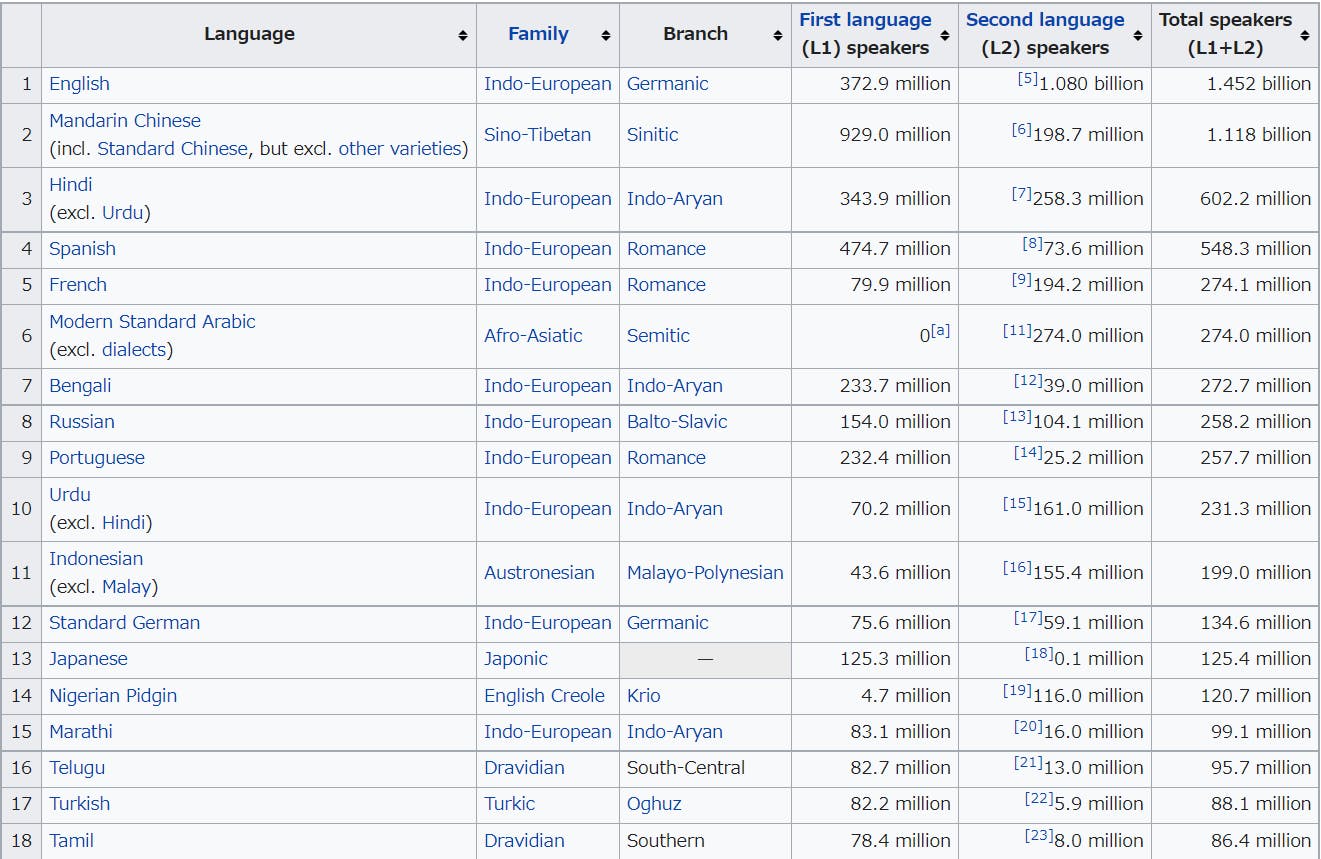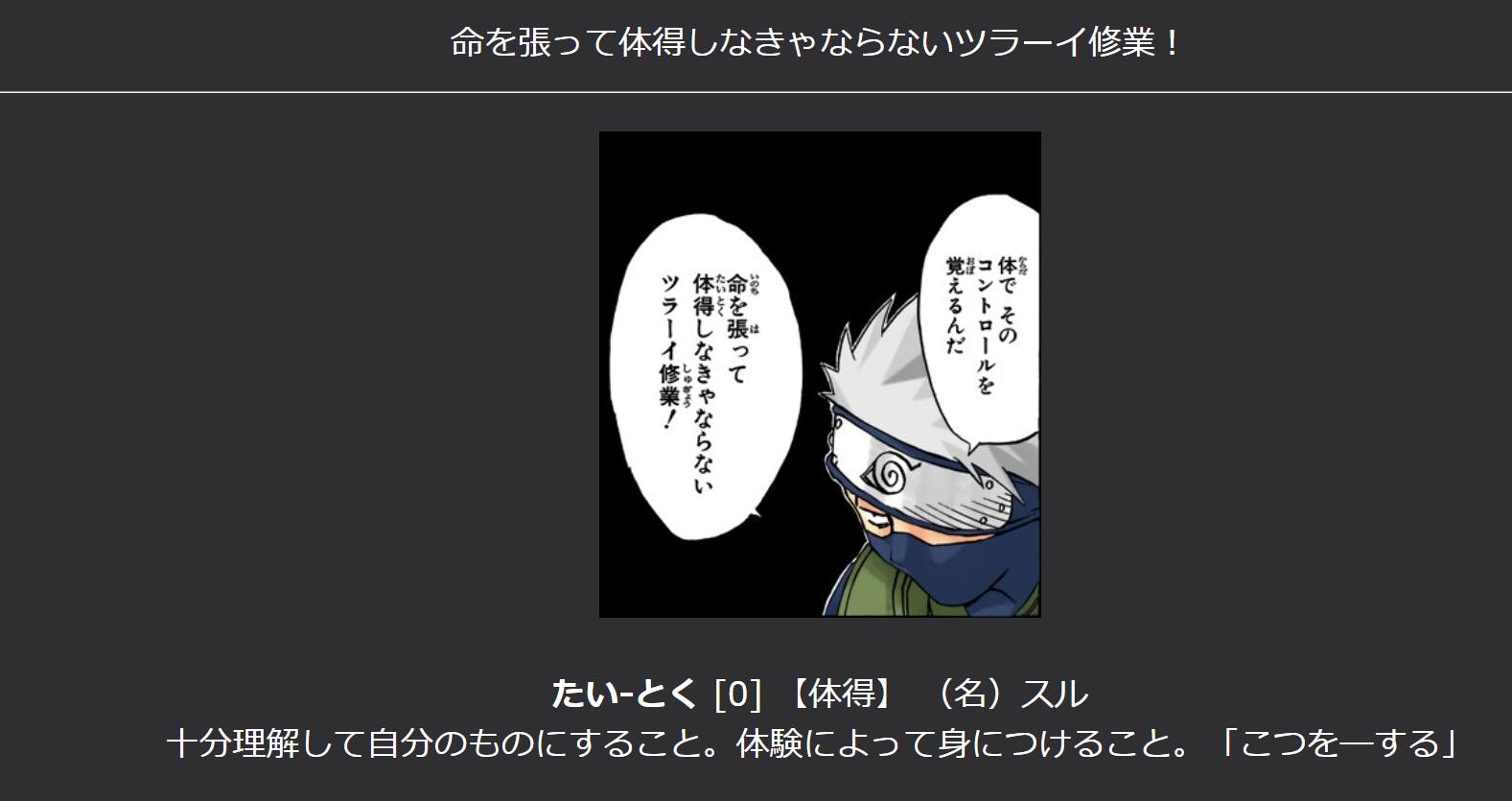How To Not Learn Japanese
Japanese is a human language spoken by very ordinary humans on an archipelago we English speakers call "Japan". We also refer to these people as "Japanese people" and say that Japanese is their "native language". However as Khatzumoto(1) explains, if you take the word "native" back to its Latin root "nativus" it literally means "to be born". So really there is no such thing as a "native language"- you aren't born knowing any language. And there is nothing special about "Japanese people" or "Japan" when it comes to (not) learning Japanese.
You may have heard that Japanese is a "difficult" language. Despite the global impact of Japanese culture, according to Wikipedia Japanese boasts 125.3 million first language speakers but only has .1 million second language speakers. Additionally, out of that one hundred thousand second language speakers, how may could honestly call themselves "fluent"? I certainly can't.

Just taking a look at this chart Japanese is certainly an outlier, the only other noticeable outlier being Modern Standard Arabic which is not a first language. Well, I guess it can't be helped then! Japanese is just too difficult. I guess you should try DuoLingo for a week then quit and suck forever. If only those damn Asians wrote with civilized letters instead of incomprehensible squiggles(2).
BOGUS!!
There is no such thing as a "too difficult" language. Japanese is a human language spoken by very normal human beings like me and you. And I don't wanna hear the "I'm too old" excuse either. Being older does not make learning a language harder, in fact it makes it much easier. I've been studying Japanese for less than two years and I can speak, read, and write the language a thousand times better than any two-year-old "native speaker" on the planet. Steve Kaufmann is 81 years old and speaks 20 languages, including Japanese which he speaks very well, how do you explain that? Is he just talented?? Lucky??? ABSOLUTELY NOT!!!!!!!
What is culture? My favorite Japanese dictionary defines it as "社会を構成する人々によって習得・共有・伝達される行動様式ないし生活様式の総体。" which in short translates to "People's learned, shared, and passed on practices or ways of life that form a society". Language is part of culture and hence nothing more than a shared way of life. Which brings me back to the title of this post: "How To Not Learn Japanese". You can't buy a textbook and go to a class to "learn" Japanese like you would learn math or pottery. No one can "teach" it to you.
You don't learn a language, you live it
How come babies always succeed in "learning" languages but adults almost always fail? I'll give you a hint- they aren't learning any faster than me or you. It's because, even though it's ten times slower to learn as an adorable drooling idiot, babies consistently put in a thousand times the hours leaving them with a hundred times better results. They learn (without even being consciously aware of it) every minute of every day for (usually) their entire lives.
Okay! That's cool for babies but what about me? I have a boyfriend/girlfriend/wife/kids/playLeagueOfLegendsallday I don't have that sort of time!!!
That's okay! First of all you are reading this post meaning you already know at least one language, making your life easier. A "native" Japanese speaker not only needs to learn that 橋 means "bridge" but also needs to learn what a "bridge" even is and is also very stupid unlike you my handsome and brilliant reader who is hopefully not wearing diapers. Second of all I have a shortcut, well really three but you use them together
1) Reading
2) Writing
3) An SRS (spaced repetition system)
To obtain a high level of proficiency in a language you need to acquire LOTS of words. It is much easier to learn all of these words by reading a lot then it is by listening, which is how illiterate children do it (so inefficient!) Of course you need to practice listening a lot as well, but the majority of the language you acquire should come from reading. People will tell you that you must also learn grammar- don't listen to these people. I bet they also recommended buying a textbook and taking a college class, which is of course nothing more than a waste of time and money. Anyways, you don't need to learn grammar rules because 1) they're stupid and made up and more importantly 2) by reading enough to learn all the words you need to know you will inadvertently master grammar rules just like how you did in your first language.
Leading scientific research done by people like Steven Krashen (awesome guy, you should look him up) tells us that human beings acquire new language by comprehending messages in the language that they previously were unable to comprehend. However, let's say you're a beginner in Japanese and you pick up a Japanese comic book and try reading it for an hour. The vast majority of it is going to be totally incomprehensible, but occasionally you will find a sentence with just one word you don't know, and through either a dictionary lookup or context clues you will understand the previously incomprehensible message, hence acquiring language. But you will likely forget that new word in a few minutes as you go back to reading, where most of the stuff you're reading will be almost completely incomprehensible. This problem doesn't go away when you get better at a language either- when I go and read a Japanese comic book I already easily understand the vast majority of what I am reading, which means that the majority of the time I am not learning anything new, only occasionally coming across a new word giving me a chance to learn something. A lot of people have mastered languages through this approach (it certainly works!) but we can do much better.
 Introducing the spaced repetition system. When you see a sentence with just one word that you didn't know (or maybe two if they seem easy or you don't care because you really like the sentence), but after looking up the word(s) or by using context clues you can understand the sentence, you turn that sentence into a digital flashcard. If it's from a comic book the front would be the sentence typed out, and the back would be the panel of the comic book and the definition of the word(s) you didn't know. The above card is taken from the Japanese comic book Naruto, and the word being learned is 体得 which can be translated to "mastery" or "learning through experience". Note: When you're a beginner you will have to learn words through English translations but as you get more advanced you will switch to Japanese definitions. More on this in another post. Anyways, each of these digital flashcards will have "intervals", and as you correctly recall the meaning and reading (how to pronounce) the sentence the "interval" will get longer (starting at a few days, then going up to weeks, eventually months and years), but if you forget it the interval resets. Spaced Repetition Systems are scientifically proven to be incredible for long term memory, personally I recommend using Anki (free, open source, the best) but you can use whatever one you like it's really personal preference. Let's say each day of reading Japanese comic books you make 10 of these flashcards and study them for an hour a day. In this hour a day of studying each second is comprehending messages that you were previously unable to comprehend- nothing is too easy or too difficult- maximizing efficiency. Additionally, studies show that writing by hand drastically improves memory, so whenever you fail to recall the meaning or reading of one of your flashcards write it out by hand. Trust me, it works wonders.
Introducing the spaced repetition system. When you see a sentence with just one word that you didn't know (or maybe two if they seem easy or you don't care because you really like the sentence), but after looking up the word(s) or by using context clues you can understand the sentence, you turn that sentence into a digital flashcard. If it's from a comic book the front would be the sentence typed out, and the back would be the panel of the comic book and the definition of the word(s) you didn't know. The above card is taken from the Japanese comic book Naruto, and the word being learned is 体得 which can be translated to "mastery" or "learning through experience". Note: When you're a beginner you will have to learn words through English translations but as you get more advanced you will switch to Japanese definitions. More on this in another post. Anyways, each of these digital flashcards will have "intervals", and as you correctly recall the meaning and reading (how to pronounce) the sentence the "interval" will get longer (starting at a few days, then going up to weeks, eventually months and years), but if you forget it the interval resets. Spaced Repetition Systems are scientifically proven to be incredible for long term memory, personally I recommend using Anki (free, open source, the best) but you can use whatever one you like it's really personal preference. Let's say each day of reading Japanese comic books you make 10 of these flashcards and study them for an hour a day. In this hour a day of studying each second is comprehending messages that you were previously unable to comprehend- nothing is too easy or too difficult- maximizing efficiency. Additionally, studies show that writing by hand drastically improves memory, so whenever you fail to recall the meaning or reading of one of your flashcards write it out by hand. Trust me, it works wonders.
Although the SRS is incredible it shouldn't be the only way you learn. Pretend you are a native speaker and put as much fun and interesting Japanese stuff in your life as possible- no boring textbooks allowed! After all, (not) learning a language is nothing more than a game of make-believe. Surround yourself with your favorite Japanese books, music, and tv shows(3) and always be on the lookout for the perfect sentence to add to the SRS. Do it this way and you will find yourself subconsciously doing things in Japanese, just like how you would in your native language. Now stop reading this damn post and do something fun in Japanese!
(1) Khatzumoto is the founder of AJATT. I have been deeply inspired by him, his ideas, and his fun attitude towards learning Japanese.
(2) You should also use the SRS to help learn the writing system, more on this in another post.
(3) Do not ever under any circumstances watch these with English subtitles. You will get better at Japanese by comprehending messages in Japanese, not by ignoring what is being said in Japanese and pretending that it's whatever the cringey subtitle says. Ideally you will watch Japanese shows with matching Japanese captions so you can easily look up words and also simultaneously practice reading. I will explain how to do this in another post.
